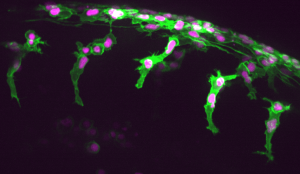Research Assistant in the Scarpa lab, Cambridge
Posted by Elena Scarpa, on 3 February 2022
Job type: Research Assistant
Location: Cambridge, UK
Closing Date: 25 February 2022
We are pleased to advertise a Research Assistant position in Dr Elena Scarpa’s group to investigate the role of tissue-scale mechanical stress during in vivo cell migration and cell division.
We investigate a population of embryonic multipotent stem cells, neural crest cells. In the trunk of the Zebrafish embryo, these cells migrate through a narrow space in between other tissues before differentiating into glia and neurons. We have found that neural crest cells experience significant nuclear deformation during migration. Moreover, they divide asymmetrically, giving rise to daughters with different fates, and, importantly, sometimes they make errors when dividing. These findings are important for human health because human trunk neural crest can initiate neuroblastoma, a common solid tumour in children.
Using fish neural crest cells as a model, relevant to human disease, to study in vivo cell confinement, the lab investigates how physical compression affects nuclear integrity and cell division, and whether it can lead to cancer initiation in a living animal.
The post-holder will carry out molecular biology and zebrafish transgenesis. They will characterise the novel Zebrafish lines they generate by live imaging of embryos and quantitative image analysis. In addition, they will have the opportunity to receive training in Dr Anestis Tsakiridis laboratory at the University of Sheffield in culture and differentiation protocols of human pluripotent stem cells into trunk neural crest cells and they will be responsible for the maintenance of these cell cultures in the lab. Besides these tasks, the RA will oversee the maintenance of fish stocks (crossing and genotyping), day to day running of the laboratory (ordering, organization, health and safety) and will contribute to the training of students.
Candidates should have a BSc in a biological subject, with knowledge of molecular biology and genetics (for example: molecular cloning, transgenesis, CRISPR), and a keen and proactive approach to collaborative science. The ability to plan, execute and record scientific studies and make independent decisions and solve routine problems encountered in research projects is essential, as are excellent verbal and written communication skills.
This position is available full-time from 1 May 2022 for 16 months.
We also welcome applications from individuals who wish to be considered for part-time working or other flexible working arrangements.
We particularly welcome applications from candidates from a BME background for this vacancy as they are currently under-represented at this level in our department.
If you have any questions about this vacancy, please contact Dr Elena Scarpa: es697@cam.ac.uk.
To apply, please click on external job link at the bottom of this page.

Salary: £27,116-£31,406
Start date: 1 May 2022
Closing Date: 25 February 2022
Scientific fields: Development and disease, Cell biology, Morphogenesis, Cell fate control and differentiation
Model systems: Zebrafish, Cell culture
Duration: Fixed term
Minimum qualifications: BSc, MSc

